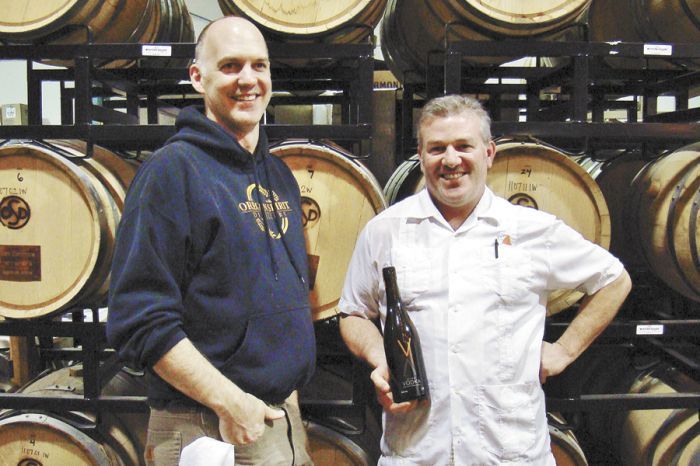A Labor of Lava

By John Gottberg
The unique collaboration between a Central Oregon micro-winery and a spirit distillery has produced a high-end commercial vodka with a distinctive oaky flavor.
Volcano Vodka, produced by Volcano Vineyards in conjunction with Oregon Spirit Distillers, was released to the public on Feb. 2. The spirit was distilled from three single-vineyard, red-wine varietals aged for years in French oak barrels.
“It has hints of oak that I have not tasted in any other vodka,” said Oregon Spirit owner Brad Irwin.
Only 10 cases of Volcano Vodka, priced at $40 a bottle, have been made available to the public. “These initial 120 bottles will be the only ones ever made with this formulation, due to the high production costs,” said Volcano’s Scott Ratcliff.
Ratcliff and Irwin distilled one barrel of Syrah from the Fortmiller Vineyard in Talent, and barrels of Zinfandel and Cabernet Sauvignon from the Callaway Vineyards of Healdsburg, Calif., to make the vodka. In all, three 60-gallon batches were distilled in a 100-gallon still.
The usual process of fermenting a spirit was bypassed. Typically, Irwin said, starch is extracted from a grain by mashing it with heated water and enzymes. Yeast is then added to “eat” the resulting sugar, leaving only alcohol.
“After a week of fermentation, we usually have 11 to 12 percent alcohol,” Irwin said. “Scott’s wine was 14 percent.”
For four days, in a trio of three-hour sessions each day, the wine was pumped into Oregon Spirit Distillers’ still. It was heated to a boiling point of 73°C (163°F). As vapor rising through the columns was cooled, Irwin collected the condensation, blending the liquid of each grape with the others — but the quantity of distilled product was only one-third what went in.
“We probably wouldn’t do this exact process ever again,” Ratcliff said. “We’ll likely do something, but not single-vineyard varietals. It would make more sense for a larger winery to do this. It’s a volume thing.”
The next time he makes a distilled spirit, Ratcliff said, “I would purchase bulk wine in a tank or barrel, because you’re losing so much.”
Nevertheless, Ratcliff is pleased with the result. “One of the unique characteristics of this vodka, due to the fact that it aged in oak, is that it has a slightly oaky nose,” he said. “The distillation concentrated those aromas, giving it a nose reminiscent of whisky.”
Irwin enjoyed the collaboration. “The partnership that went into creating this product was really fun,” he said. “We’re excited to have been involved.”
At first, said Ratcliff, Volcano Vodka was no more than a name. “Shortly after I trademarked Volcano Vineyards (in 2004),” he said, “I also trademarked the name ‘Volcano Vodka.’ A few years later, I was told that I had to actually make the stuff to keep the trademark.”
The company is in the process of applying for a license to build a distilled spirits plant at its 277-square-foot winery and tasting room, in the Century Center complex on Bend’s west side. Ratcliff said he hoped to begin producing spirits there in late summer or early fall of this year.
“At the very least,” he said, “we want to be able to put a float of rum on top of the fruit sangrias we make.” Low-alcohol Magmita Sangria comes in three different flavors: peach, strawberry-kiwi and cranberry-pomegranate.
Volcano purchases grapes from several Southern Oregon and California vineyards to make Merlot, Syrah, and red and white blends. Its Bend Blend wines feature hybrid grapes produced by the Monkey Face Vineyard in Terrebonne.












